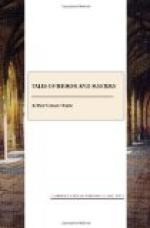Up to this point the young lady’s evidence had appeared to make against the prisoner rather than in his favour. The questions of her counsel, however, soon put a very different light upon the matter, and disclosed an unexpected line of defence.
Mr. Humphrey: Do you believe your brother to be guilty of this crime?
The Judge: I cannot permit that question, Mr. Humphrey. We are here to decide upon questions of fact—not of belief.
Mr. Humphrey: Do you know that your brother is not guilty of the death of Doctor Lana?
Miss Morton: Yes.
Mr. Humphrey: How do you know it?
Miss Morton: Because Dr. Lana is not dead.
There followed a prolonged sensation in court, which
interrupted the examination of the witness.
Mr. Humphrey: And how do you know, Miss Morton, that Dr. Lana is not dead?
Miss Morton: Because I have received a letter from him since the date of his supposed death.
Mr. Humphrey: Have you this letter?
Miss Morton: Yes, but I should prefer not to show it.
Mr. Humphrey: Have you the envelope?
Miss Morton: Yes, it is here.
Mr. Humphrey: What is the post-mark?
Miss Morton: Liverpool.
Mr. Humphrey: And the date?
Miss Morton: June the 22nd.
Mr. Humphrey: That being the day after his alleged death. Are you prepared to swear to this handwriting, Miss Morton?
Miss Morton: Certainly.
Mr. Humphrey: I am prepared to call six other witnesses, my lord, to testify that this letter is in the writing of Doctor Lana.
The Judge: Then you must call them tomorrow.
Mr. Porlock Carr (counsel for the prosecution): In the meantime, my lord, we claim possession of this document, so that we may obtain expert evidence as to how far it is an imitation of the handwriting of the gentleman whom we still confidently assert to be deceased. I need not point out that the theory so unexpectedly sprung upon us may prove to be a very obvious device adopted by the friends of the prisoner in order to divert this inquiry. I would draw attention to the fact that the young lady must, according to her own account, have possessed this letter during the proceedings at the inquest and at the police-court. She desires us to believe that she permitted these to proceed, although she held in her pocket evidence which would at any moment have brought them to an end.




